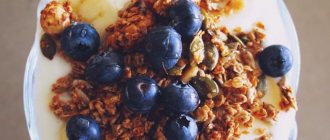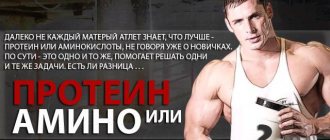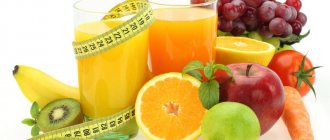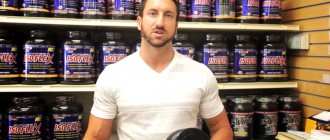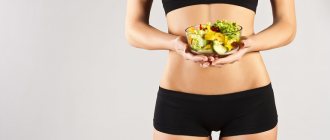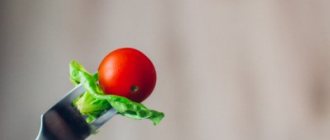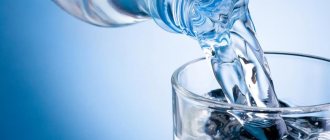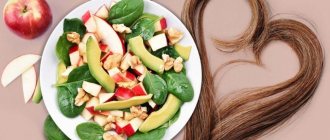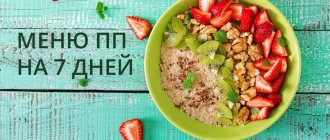Nutrition for athletes: basic concepts and principles
Achieving the highest performance in sports requires athletes to adhere to a strict diet. That is why proper nutrition contains in its arsenal the products necessary for athletes, based on the following principles:
- training nutrition requires daily eating food with a sufficient level of energy indicators, vitamins, minerals and other microelements;
- you should add all kinds of biologically active additives of natural origin to normalize metabolism and activate the metabolic process;
- nutrition for athletes needs to be changed, since it directly depends on body weight (decreasing, increasing or maintaining the same weight).
To avoid an energy imbalance and not to affect the vital functions of the athlete’s body (respiratory, digestive or cardiovascular), it is imperative to monitor the quality of the nutrients consumed. Therefore, athletes eat exclusively healthy, highly environmentally friendly food without genetic modifiers and other chemical elements.
The role of good nutrition in the lives of athletes
Athletes eat nutritiously, carefully monitoring the amount of calories, proteins, fats and carbohydrates they consume. A balanced diet for bodybuilding athletes is, first of all, healthy, natural, animal or plant products, correctly distributed throughout the day.
As a rule, recipes for athletes require strict planning and calculation, according to percentage standards and the ratio of proteins, fats and carbohydrates (BJU). This is due to different types of physical activity and sports. Therefore, proper nutrition for an athlete, enriched with vitamins, is more than specific and must meet the following requirements:
- enrichment with all kinds of micronutrients;
- constancy and normalization of literally all metabolic processes;
- keep morphological indicators in good shape by regulating and maintaining the weight of the whole body as a whole.
A diet for an athlete, based on fresh and high-quality products, allows you to forget about unforeseen unhealthy situations: illness, injury, exhaustion, imbalance, and so on.
Basic principles of a sports diet
Healthy nutrition for literally all athletes, regardless of the type of sport, requires the consumption of large amounts of water and a strictly defined amount of calories and elements that will replenish the costs of vital organs. Food for athletes requires the intake of natural protein-carbohydrate components and unsaturated fats. The formula for the ratio of BJU in units, close to WHO standards, looks like this: BJU = 1:1:4. Micronutrients, vitamins and minerals must be consumed daily so that the organs are saturated and do not experience unexpected “failures”.
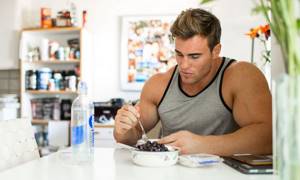
A diet for athletes, firstly, begins with calculating calories based on the required portion of proteins. This is due to the type of sport and the required physique. After all, protein ingredients are the primary “foundation” for muscle growth. If the goal is to lose weight, “get dry,” it is advisable to reduce their number to a minimum.
Just like the level of protein consumed, carbohydrates are calculated based on the degree of saturation. They can be absorbed slowly or difficultly and for a long time by the cells of the body. To absorb many beneficial substances, you need to take a reasonable approach to fat consumption.
The World Health Organization (WHO) has published the basic principles on which an athlete's balanced diet is based:
- steamed vegetables, fresh fruits (minimum 400-500 g) should be eaten every day;
- given the speed of digestion of fruits, they should be eaten half an hour to an hour before the main meal;
- root vegetables containing a lot of starch (potatoes) should be limited due to their high vitamin C content;
- consumption of trans fats up to 1% and fats of different origins up to 10% reduces the risk of heart disease and diabetes;
- fried foods are strictly prohibited, since omega-3,6,9 are converted into toxic, poisonous substances;
- salt and sugar should not exceed 10% of the daily value;
- before 14:00 you need to eat as many carbohydrate and fatty foods as possible;
- You should have dinner 3 hours before bedtime or 1.5 hours if it is dairy products.
Fats
Fats are another group of organic compounds that perform important functions in the body. For a long time it was believed that saturated fats cause the formation of cholesterol plaques in blood vessels. However, recent studies have completely vindicated fats - at least those that enter the body with food: they do not affect the level of cholesterol in the blood. However, the amount of saturated fat in the diet should be reduced because these substances slow down metabolism, and a diet rich in saturated fat is nothing more than a recipe for obesity.
Saturated fats are margarine, butter, animal fat, chicken skin, pastry creams, coconut oil. Also, saturated fats are found in abundance in the notorious fast food. But there are also unsaturated, vegetable fats that are quickly absorbed by the body. Unsaturated fats should never be excluded from the diet - their deficiency leads to hormonal imbalances and weakened immunity. Without unsaturated fats, muscle tissue does not grow and vitamins are poorly absorbed. Unsaturated fats are found in olive, corn, soybean, cumin oil, fish, seafood and nuts.
You don’t need as much fat as carbohydrates or proteins: no more than 0.6 grams per kilogram of the athlete’s weight. The amount of fat in the diet should not exceed 20% of total calories.
Composition of an athlete's diet
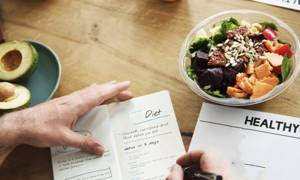
Features of rationally formulated nutrition for athletes include the mandatory presence of the following components:
- proteins – from 30 to 35%;
- fats – from 10 to 20%;
- carbohydrates – from 50 to 60%.
Depending on gender, age, number of workouts, set goals and required tasks, an individual menu is compiled. At the same time, the food of athletes should not exceed the above percentage of BZHU and have a positive effect on maintaining a healthy, fulfilling, athletic lifestyle!
Squirrels
The correct diet for a beginner or an experienced athlete must include food that includes slowly and quickly digestible proteins. It is these components, successively consisting of amino acids, that are endowed with proteins and peptides. These organic catalyst substances develop growth, strengthen tissues and are essential for maintaining the immune system.
An athlete's daily diet requires him to consume foods rich in protein components. Average statistical data suggests that you should eat from 15 to 25 g of protein per 10 kg of your own body weight per day. This is directly related to the activity and tension of the body.
An athlete who wants to gain weight should eat foods high in protein components. The California Research Foundation has identified 7 essential foods for heavy and bulk athletes. These are cottage cheese, milk, chicken eggs, boiled or steamed beef, chicken fillet (breast), red sea fish, chickpeas (chickpeas).
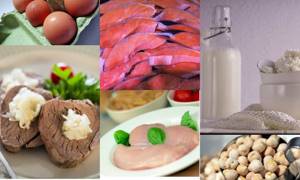
To maintain or reduce body weight, you need to eat healthy foods with a small amount of protein: lean veal, rabbit, poultry, low-fat bran kefir, light sour cream, yogurt, seafood.
Carbohydrates
Carbohydrates are biologically active, organic substances that perform a variety of beneficial functions in the body. They are the basis of metabolic processes, restoration of strength, and increase in energy. That is why sports nutrition products should include simple and complex carbohydrates.
An athlete's diet should include from 5 to 9 g of carbohydrates per 1 kg of body weight per day. Therefore, sports nutrition per week implies from 35 to 63 g of carbohydrates per 1 kg of weight. Moreover, the emphasis should be on complex carbohydrate foods and consume them strictly before 14:00. That is, in the first half of the day.
It is believed that the main source of complex carbohydrates is starch. It is the starch substance that is produced by any plant, which, when entering the body, provides it with long-lasting energy - glucose.
Fats
A sports, balanced and at the same time strict diet should include healthy, healthy fats. After all, they are consumed in the process of power, heavy loads, which are characterized by a slow rhythm of execution. Fat elements maintain the stability of internal organs and body temperature.
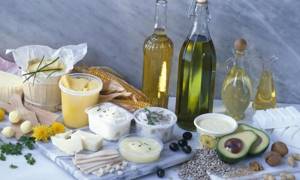
Fats come in both plant and animal origin. That is why recipes for active athletes are prepared taking into account different variations of fats. For example, this could be a salad with olive oil to fill the body with hydrogen.
To maintain an athletic figure, proteins and fats must be consumed together. However, you need to be careful when choosing products. That is, give preference to low-fat cottage cheese, eat eggs without yolk, and so on. Bodybuilder Denis Semenikhin tells us more.
Proper nutrition during training
First of all, you don’t need to eliminate glucose from your diet completely. It must be present in a small dose in order to maintain energy for muscle gain. The secret to building muscle and losing fat at the same time is maintaining proper blood sugar levels. When you provide glucose to your body, your body burns it, using it as an energy source for high-intensity workouts. Typically, you get glucose from sugars and starches (carbohydrates) in your diet. The more carbohydrates you consume, the more glucose will be burned during your workout. This reduces the use of proteins (amino acids) from the muscles, preventing catabolism (muscle breakdown). Choose low-fat carbohydrate sources. Of course, exactly how many calories you consume is important
When you reduce your carbohydrate intake, your muscles burn glucose during exercise. This encourages your body to burn more fat, thereby saving any available glucose for those tissues that really need it (like the brain). Your body will use fat for energy. And you should also consume plenty of protein , this is required to meet the needs of the muscles, preventing their wasting.
The problem with following a carbohydrate-restricted diet to lose body fat is that you are susceptible to "muscle depression syndrome." As serious bodybuilders know, when you eat fewer carbohydrates, your muscles lose glycogen and water. This causes them to "deflate" - they become smaller, and muscle growth can come to a halt.
So, if you want to build or even just maintain muscle, you must maintain your glycogen levels. This means you need to eat enough carbohydrates .
List of main products
Nutritionists select sports nutrition products in such a way that they support not just a beautiful, sophisticated figure or bodybuilder’s structure, but that they provide a kind of impetus for vigorous brain activity.
Below is a list of sports nutrition products:
- Chicken eggs, rich in protein components, vitamins, zinc, iron and calcium.
- Low-fat cottage cheese, rich in proteins of varying degrees of speed - fast and slow. Cottage cheese is a post-workout staple.
- Cereal oat flakes, including a lot of fiber, minerals, vitamins and protein-carbohydrate elements.
- Red sea fish, which speeds up metabolic processes, supplements the body with omega-3 fatty acids.
- Buckwheat, which will help, depending on the quantity, build muscle mass or lose muscle mass.
- Beef is an excellent source of the most important components: proteins, fats and carbohydrates.
- Turkey contains a huge amount of minerals, useful rare vitamins and protein.
- Chicken fillet with a minimum percentage of fat and almost 50 g of protein per 200 g of its own weight.
- Purified water, without excess chlorine, promotes a surge of energy and proper digestion.
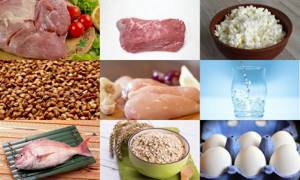
However, the features of a healthy diet for athletes do not end with the above list. Additionally: olive oil, as many seasonal vegetables as possible, low-fat sour cream, yogurt, fruits, milk, kefir, hard low-fat cheeses, cereal porridges.
Basic recommendations
- You need to eat in small portions, at least 5 meals a day.
- Before 16:00, 60% of the daily ration should be eaten.
- The last meal should be made of protein to give the body amino acids for recovery during sleep.
- The diet should have enough fiber: bran, vegetables.
- It is preferable to cook and steam foods, avoid frying and smoking.
- Eating should be done 2 hours before the start of training.
- If the workout is in the morning, then before it you need to have something light for breakfast: banana, smoothie, cottage cheese with berries.
- If you workout at lunchtime, then you need to eat protein foods, fresh vegetables or complex carbohydrates after sports.
- In the evening after training, you should not go to bed hungry. For dinner there can be fish, cottage cheese, kefir, tofu.
Basic sports menu
An athlete’s balanced menu should be about 30% protein, 60% carbohydrate products. At the same time, protein-carbohydrate foods should remain fatty by a maximum of 10%.
The approximate nutrition of athletes for each day is represented by the following products and includes 2700 kilocalories:
- oat flakes (from 200 g);
- 5 kg low-fat cottage cheese;
- lean butter – no more than 30 mg;
- 5 kg of grain porridge (brown rice, buckwheat);
- fruits and vegetables - 300-400 g each;
- poultry meat – 400 g;
- bread – 200 g.
The basic features of rational nutrition for athletes also lie in the method of preparing the above products:
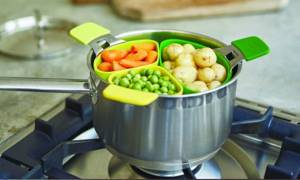
- sugar and salt may be present extremely rarely in a 10% ratio for the entire daily food intake;
- for light frying, for example, meat or fish, use olive oil, lard or melted vegetable oil;
- Vegetables must be steamed or stewed.
General concepts
Proper nutrition for female and male athletes differs in the number of grams contained in BJU. The rest of the menu is almost the same. The main thing is to eat as much as your body requires, so as not to feel hungry and, conversely, overeating. You need to eat food without haste, chewing well. An athlete needs food that will not worsen his or her well-being—healthy, natural, within its expiration date, and not expired. After all, an athlete’s days are filled not only with mundane, for example, office work, but also with strength and physical training.
- High-quality and healthy diet. Eat foods that are healthy and productive for the body.
- The amount of food eaten, taking into account the goals set, depends on the type of sport, strength activity and desires. For example, to gain muscle mass, consuming large amounts of protein-rich foods (egg and vegetable salads, cottage cheese, beef, sea fish) is of great importance.
- Amount and frequency of food intake. The current diet for athletes is the required weight portion every 3-4 hours. This will not overload the body and will maintain it in a single rhythm.
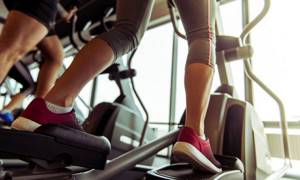
In the case of burning fat layers, cells and tissue fibers, you should adhere to one selected diet. It could be:
- Standard menu, but enhanced training on a cardio machine, orbitrek.
- Carbohydrate spasmodic. That is, on the first day you need to eat as much as you should, and in subsequent days you need to regulate the amount of carbohydrate and protein components by increasing and decreasing them.
For a male athlete
Nutrition for security athletes, in addition to a simple diet, includes biologically active food supplements sports nutrition. Sports supplements are biologically active components produced specifically for bodybuilders leading an active, strength-based lifestyle.
This is precisely why proper nutrition for male athletes differs from the usual, balanced one. The only thing is that some people prefer to receive sports nutrition along with the food they consume, while others prefer to receive it separately in the form of cocktails.
Indicative diet together with sports supplements for male athletes:
- breakfast: 200 ml of gainer or any other high-carbohydrate shake, 200 g of rice with steamed vegetables and 50 g of bread;
- pre-lunch snack: one protein bar, tea;
- athlete's lunch: 300 g baked potatoes with hard cheese, 200 g stewed beef, salad with low-fat mayonnaise;
- pre-workout: 200 ml whey protein shake, protein bar (protein), 10 g BCAA, 50 g carbohydrates;
- athlete's dinner after training: stewed fish or meat, 500 g of buckwheat or 250 g of brown rice, herbal tea to improve metabolism, 4 tablespoons of avocado;
- second dinner before bed (120 minutes before): 200 g of steamed oatmeal, freshly squeezed juice.
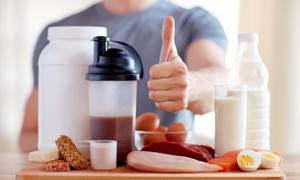
This male diet can and should vary depending on the days that include strength training. That is, after training, athletes often drink a large portion of protein and a creatine shake.
For girls
A diet aimed at female athletes is characterized by its own characteristics, although it differs slightly from nutrition for male athletes. Meals for female athletes should be filled with fiber, fast complex carbohydrates and healthy fats that help you lose weight (monounsaturated).
For a more precise understanding of what foods a female athlete needs to eat in order to eat properly, below is an approximate menu for the day:
- Morning breakfast (before 9:00) – slow-cooked oatmeal (100 g) and 3 egg whites. Additionally, you can drink green tea without sugar.
- From 10:30 to 12:00 you can have a small snack of fruit and yogurt or drink 0.5 liters of low-fat kefir.
- At lunchtime (13:00-14:00) - white poultry or red fish baked in the oven - 200 g, brown rice - 150 g and fresh vegetable salad with olive oil.
- Midday snack (around 16:00) – nuts with 200 g of cottage cheese.
- Dinner – fruit lean salad and fish or chicken fillet – 200 g.
- Second, before bed, dinner - 0.5 liters of kefir.
The menu is prepared for the week, month, and so on.
Nutrition during training
Below is the answer to the question: how to eat properly during training. You need to understand one rule: that during training you need to constantly drink! Even if the human body is dehydrated by two percent, the exercises will not give any results. 90% of beginners make this mistake.
You shouldn't drink only when you want, you need to do it regularly. After all, first the body requires water, and after a while it lets you know about it.
If you notice dehydration during class, go and quench your thirst. But to prevent this from happening, control your drinking regimen: it is recommended to drink a glass of water before training, and during the training itself every twenty minutes, but only in small portions. How much you drink can be seen by the amount of sweat.
If the workout lasts more than an hour, then it is better to drink sports drinks. If we are talking about high-calorie drinks, it is recommended to take them in small sips every ten minutes.
It is also allowed to drink juices, but they must be freshly squeezed and natural. You should not trust store-bought juices, even if they say they are natural.
Power options taking into account mode and load
If a light exercise regimen is provided, including a daily caloric intake of approximately 3500 kcal, athletes eat as follows:
- morning – 500 g of oatmeal, 4-egg omelette, 2 loaves of bread and an orange;
- 2nd breakfast – nuts, several bananas and yogurt with natural bifidobacteria;
- lunch – 4-6 medium boiled potatoes, 200 g boiled beef tongue, 200 g vegetable salad, juice;
- afternoon snack – boiled brown rice with milk (1 glass), fruits or vegetables – 150 g;
- dinner – 4-6 potatoes, carrot and olive oil salad – 200 g;
- dinner before bed – 250 g of steamed oatmeal, an additional glass of milk.
This menu is perfect for amateur athletes and those who want to maintain an ideal, muscular shape.
Nutrition for athletes on days of intense training:
- 8:00 – 2 eggs, a plate of oatmeal with raisins and toast with nut butter, 250 ml of milk;
- 11:00 – protein bar with carbohydrates;
- 14:00 – chicken broth soup (350 g), 250 g stewed beef, mayonnaise vegetable salad;
- 16:00 – sports protein shake;
- 19:00 – 300 g of steamed buckwheat, 150 g of red fish, baked in the oven, tea;
- 21:00 – 200 g of oatmeal or 200 ml of milk.
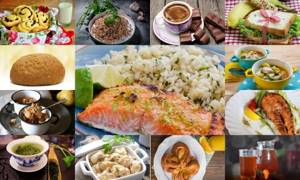
Another option takes into account the diet before the competition:
- first dose – a mug of milk, 0.5 kg of buckwheat and baked goods (bread or bun with raisins);
- second meal – coffee, half a bar of dark natural chocolate, banana, meat sandwich;
- lunch (third meal) – 0.5 kg of chicken soup, tuna or trout, 0.5 kg of rice, compote with oatmeal bread;
- fourth snack – 250 ml of freshly squeezed juice and baked goods;
- fifth – green tea and stewed chicken (approximately 160-200 g);
- before bed (two hours before) - bran bread, pear with oatmeal.
Sports nutrition for every day should be prepared taking into account the specifics and nutritional capabilities (time) of athletes. That is, the above hours are approximate for the athlete. It is necessary to select the hours of eating, taking into account the peculiarities of the daily routine: training time and work.
For strength bodybuilders and ordinary people who love sports and a beautiful figure, a diet that should remain varied is of great importance.
Below is a table of the correct foods of animal and plant origin, according to calorie content.
How to combine nutrition and exercise correctly
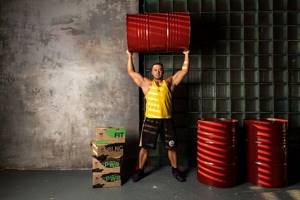
The Power line from Grow Food is a ready-made solution for those who work out in the gym and build mass
If you decide to change and become the way you see yourself in your dreams, you will have to try. An integrated approach is needed: training without a diet will not help, just like proper nutrition without sports. Let’s briefly look at the most popular areas of “body building”.
Menu during the drying and fat burning period

Proper nutrition for a healthy, muscular athlete sometimes requires adjustments that are designed to “dry” muscle mass, that is, burn fat. This is necessary for “drawing” muscle relief by getting rid of excess fat deposits.
Below is a balanced diet for male athletes (reference: body weight 90 kg, height 182 cm):
Day 1. Food norm.
- chicken and potatoes - 200 g each, salad of one tomato and cabbage leaf;
- low-fat cottage cheese – 200 g, orange and banana;
- fish and rice - 250 g each, sweet pepper and 3 leaves of white cabbage;
- potatoes and veal - 150 g each, 5 boiled eggs (without yolks), a couple of leaves of Chinese cabbage;
- chicken breast – 150 g, boiled rice – 60 g, 3 lettuce leaves, tomato, pepper;
- 200 ml orange juice and 200 g chicken.
Days 2 and 3. Carbohydrate reduction period.
- steamed fish - 200 g, salad of 100 g white cabbage and one tomato;
- 7 boiled eggs without yolks and 2 tangerines;
- 200 g boiled breast, a couple of lemon slices, parsley, zucchini - 150 g;
- 7 boiled proteins and 2 grapefruits;
- 200 g of sea fish, tomato and white cabbage;
- fish salad: 2 cans of tuna, 1 tsp. olive oil, green onions, tomato, vegetable bread, lettuce.
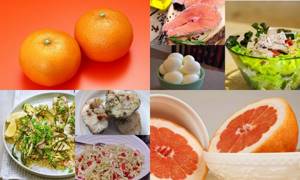
Day 4. Increase carbohydrates.
- chicken salad: boiled protein, potatoes (100 g), Chinese cabbage (3-5 sheets), pepper, cucumber, chicken (100 g);
- cottage cheese and kefir - 200 g each, 5 tangerines;
- steamed potatoes and chicken - 150 g each, lettuce, tomato, pepper, a couple of soft-boiled eggs;
- fruit salads: kiwi, orange, tangerine, 1/3 apple and grapefruit, 10 grapes and the kernel of any nut, preferably a walnut.
Day five repeats the norm of usual products for athletes, that is, day one and so on.
Sports menu for the week for the fair sex (weight approximately 60 kg, height 168 cm).
The first day:
- boiled rice and fish – 50 g each, half an orange;
- protein omelet (from 2 eggs), 100 ml milk;
- steamed buckwheat and lean meat (fillet) - 60 g each, tomato and three olives;
- low-fat cottage cheese - 120 g, banana and half an orange.
Days two and three:
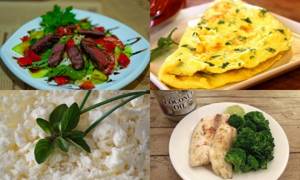
- omelette of three eggs (two whole and one white), 100 ml of milk;
- veal – 60 g, sweet pepper and lettuce, green onions and parsley;
- 150 g cabbage (broccoli or cauliflower), boiled fish - 100 g, lemon wedge;
- low-fat cottage cheese – 80 g.
Day four:
- oatmeal with raisins and dried apricots – 50 g;
- three proteins, brown or wild rice - 30 g, half an orange;
- chicken broth – 70 ml, 30 g buckwheat, tomato and three olives;
- 125 g homemade yoghurt.
Similar to the men's cutting diet, the fifth day repeats the first, the sixth day repeats the second day, and so on.
For effective results, the above diet should be maintained for a month. At the same time, you should not lose sight of your usual sports activities.
The menus given are tailored to a specific body weight. To create a personal diet, it is necessary to take into account the following parameters: gender, body weight, body constitution, previously consumed amount of calories, daily activity (work, number of daily workouts).
Objectives of a sports diet
A sports diet and exercise for any person means a healthy lifestyle and a beautiful physique . Different sports require different diets: in terms of calories, diet, and food composition. Now let's imagine sports such as rhythmic gymnastics, bodybuilding and biathlon. Why do they need a sports diet ?
Gymnasts should absolutely not gain extra pounds, but they need strong muscles and a standard weight. The diet of gymnasts is balanced and provides a sufficient supply of vitamins and minerals. But the serving size is very small.
A bodybuilder needs to build muscle mass. It is necessary to consume sufficient amounts of food rich in proteins and carbohydrates, plus strength training.
A biathlete needs strength to run the entire distance and reach the finish line, that is, she needs to replenish lost energy during exercise and maintain weight. The diet should be based on the general principles of sports nutrition plus vitamin supplements.
Features of sports nutrition
- A sports diet in each case must be selected individually.
- The daily norm is 1,400 – 1,500 kilocalories.
- The diet directly depends on sports activity.
- The diet is intended for both professional athletes and those who want to stay in shape.
- A sports diet will be more effective if you add intense training and follow a sleep schedule.
- If all conditions are met, on average 2 kg are lost in 7 days.
Main components of the diet:
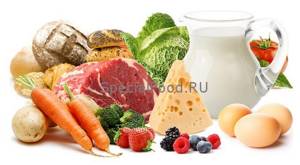
- Achieve an average calorie diet (count calories).
- The sports diet provides for fractional meals.
- Food should consist of natural products.
- Control over the time and amount of food consumed.
- Eat five meals a day in small portions.
Some recommendations for menu planning
To remain satisfied with the effectiveness of the diet and muscle definition, here are a few recommendations:
- The main products in sports nutrition will be proteins, as well as complex carbohydrates. They produce energy for sports. And protein foods are involved in proper metabolism and promote muscle building.
- The workouts will work to build muscle. This requires large energy costs, which means that food with the required calorie content must be supplied with the diet. In a sports diet, the diet should be of average calorie content. You can correctly calculate the exact number of calories in food with the help of a specialist.
Recommendations from professionals
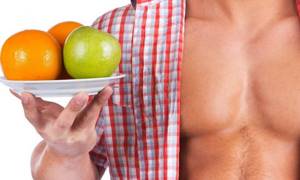
On the topic of “Nutrition for Athletes,” many fitness trainers quite often argue and establish their own personal and acceptable principles of nutrition. However, there are generally accepted recommendations that any bodybuilding coach will tell you:
- Each athlete must have a personal menu. The diet should be compiled based on weight, age category, gender, training time and load.
- Regardless of individual characteristics, nutritional principles should be maintained in the ratios BZHU: 30-10-60%.
- Athletes' nutrition should include nutritious, natural food, without chemical additives.
- You shouldn't overeat, but you shouldn't feel hungry either. You need to eat slowly, chewing well.
- Cereals should be consumed not in light, but in dark shades. For example, it could be buckwheat or brown rice.
- It is necessary to increase strength and endurance through natural carbohydrates and gainers. Drinking chemical energy juices is strictly prohibited.
- Use sports supplements with caution, knowing when, how and why.
- In moments of “drying”, losing extra pounds, it is necessary to spend more calories obtained from food. Optimal weight loss should be approximately 500 to 1000 g over 7 days. It is worth remembering that losing weight is stress for the body, which needs to be relieved with vitamins and beneficial minerals.
Main conclusions
A sports nutrition regimen during training requires strict adherence to the regimen.
When switching to a new diet, it is necessary to take into account both general and individual factors so as not to harm your health.
We should not forget about the drinking regime, as well as taking sufficient amounts of vitamins and minerals.
When switching to a new type of diet, it is necessary to consult with a specialist to develop an optimal diet, taking into account all individual characteristics.
